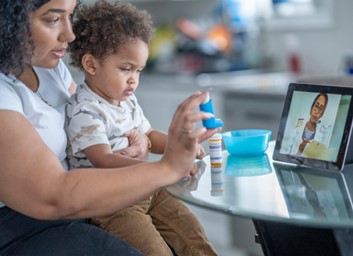Co-Lead: Munmun De Choudhury, Ph.D. & John Constantino, MD.

Patient-centered care delivery is dedicated to improving pediatric health through integrated care. This pillar will lead to new approaches in addressing barriers to healthcare access, with an initial focus on behavioral health, healthcare access for children and families. We will take a holistic view of care and delivery around the “whole child,” including the child’s physical, psychological, social and emotional needs as well as the needs of their families, caregivers and environments.
The three focus areas of patient-centered care delivery are:
- Care coordination and integration of pediatric healthcare: Delivering care through multiple settings (in clinic, at home, in school and via telehealth) and across different providers and services.
- Care system navigation through a single-digital solution: Connecting care systems outside of Children’s through a unified interface to integrate scheduling and referral systems, communication between patients and parents/caregivers, and submission of lab and imaging
- Health policy for supporting care coordination and improving access: Enhancing care coordination, access to different modalities of care and technological advancements.
Projects will be conducted over a five-year period, and will include surveys to better understand the needs of patients, research for improving and creating new technologies, and improvements in the physical and digital logistics of receiving care.
The focus areas within this pillar will change how we approach health and well-being for children: moving toward a “whole child” approach to care delivery; rethinking how we understand illness so we may treat and empower patients to experience illness without being defined by it; and transitioning to an integrated healthcare delivery system that includes children and caregivers as part of the treatment process.
A key component of “whole child” healthcare is providing children and adolescents with the tools they need to understand their own health and well-being. This pillar supports health education and engagement, targeting children without strong health education programs in school to encourage children to build healthy habits and recognize the importance of preventative measures to avoid illness.
This pillar also will increase access through online and in-person structures that make it easier for children and families to navigate the care system. Solutions through telehealth and artificial intelligence, along with better coordination and integration of services within multiple care settings through referrals and streamlined scheduling, will help improve communication between care providers and families. These solutions will be paired with health policy measures to support innovations that reach all communities. Research on patient-centered care will center on Medicaid-insured children, who make up 60% of the patient population at Children’s.
By focusing on patient-centered care delivery, the PTC will be better able to understand, treat and communicate with children and their caregivers. Donor support of this pillar will facilitate research that will help identify opportunities for improvement in the healthcare system and find solutions to these challenges, ultimately helping to improve the treatment and care of children.



